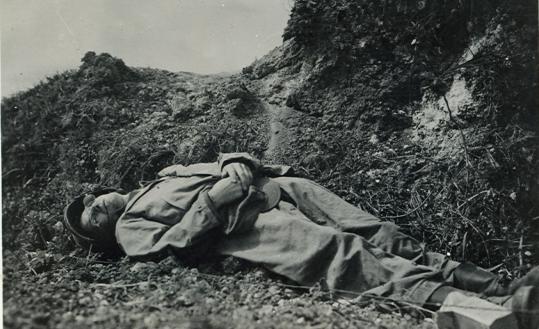
This photo provided by Richard Strasser, perhaps never before published, shows famed World War II war correspondent Ernie Pyle shortly after he was killed by a Japanese machine gun bullet on the island of Ie Shima on April 18, 1945.
On the third morning, a jeep carrying Ernie Pyle and three officers came under fire from a hidden machine gun. All scrambled for cover in roadside ditches, but when Pyle raised his head, a .30 caliber bullet caught him in the left temple, killing him instantly.
Roberts and two other photographers, including AP’s Grant MacDonald, were at a command post 300 yards away when Col. Joseph Coolidge, who had been with Pyle in the jeep, reported what happened. Roberts went to the scene, and despite continuing enemy fire, crept forward — a “laborious, dirt-eating crawl,” he later called it — to record the scene with his Speed Graphic camera. His risky act earned Roberts a Bronze Star medal for valor.
Roberts’ photograph, however, was never seen by the public. He told Miller the War Department had
withheld it “out of deference” to Ernie’s ailing widow, Jerry. “It was so peaceful a death … that I felt its reproduction would not be in bad taste,” he said, “but there probably would be another school of thought on this.” MORE
WIKIPEDIA: Ernest Taylor “Ernie” Pyle (August 3, 1900 – April 18, 1945), was an American journalist who wrote as a roving correspondent for the Scripps Howard newspaper chain from 1935 until his death in 1945. His articles, about the out-of-the-way places he visited and the people who lived there, were written in a folksy style much like a personal letter to a friend. He enjoyed a loyal following in as many as 300 newspapers. Following the entry of the U.S. into World War II, Pyle became a war correspondent, applying his intimate style to the war. Instead of the movements of armies or the activities of generals, Pyle generally wrote from the perspective of the common soldier, an approach that won him not only further popularity but also the Pulitzer Prize in 1944. His wartime writings are preserved in three books: Brave Men, Here is Your War, and Ernie Pyle in England. MORE
RELATED: The Wartime Columns Of Ernie Pyle
